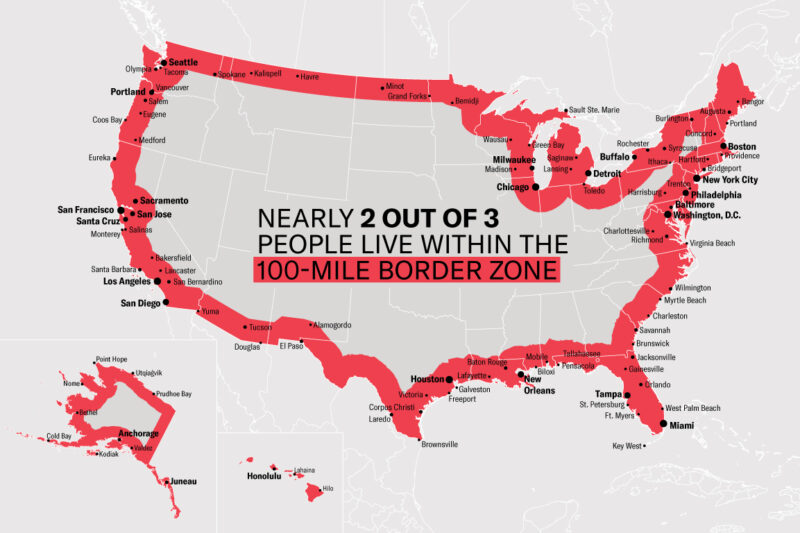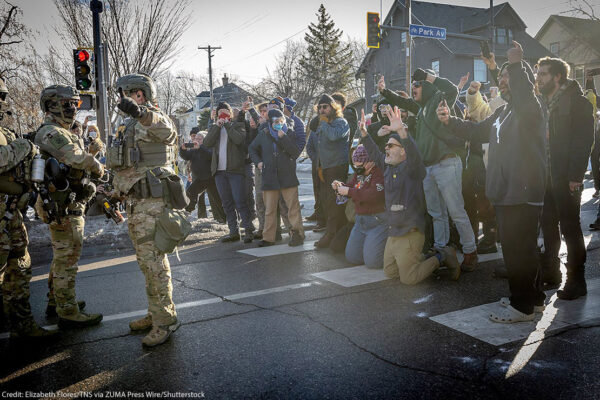
On Jan. 19, two Border Patrol agents boarded a Greyhound bus at a Fort Lauderdale station and proceeded to question passengers row by row. The bus, traveling from Orlando to Miami, had not crossed any international borders. Despite its domestic route, the agents interrogated passengers, ultimately detaining a Jamaican national who, Border Patrol claims, had overstayed her tourist visa. This story is not an isolated occurrence, and the practice is hardly new. However, a recent uptick in this type of immigration operation — from New York to Florida — has caused fear among travelers and immigrant communities. It has also raised important questions about the scope of immigration officials’ authority and the rights one has in these encounters.
Are immigration officials allowed to stop people in places wholly inside the U.S.?
U.S. Customs and Border Protection, the federal agency tasked with patrolling the U.S. border and areas that function like a border, claims a territorial reach much larger than you might imagine. A federal law says that, without a warrant, CBP can board vehicles and vessels and search for people without immigration documentation “within a reasonable distance from any external boundary of the United States.” These “external boundaries” include international land borders but also the entire U.S. coastline.
What is a “reasonable distance”?
The federal government defines a “reasonable distance” as 100 air miles from any external boundary of the U.S. So, combining this federal regulation and the federal law regarding warrantless vehicle searches, CBP claims authority to board a bus or train without a warrant anywhere within this 100-mile zone. Two-thirds of the U.S. population, or about 200 million people, reside within this expanded border region, according to the 2010 census. Most of the 10 largest cities in the U.S., such as New York City, Los Angeles, and Chicago, fall in this region. Some states, like Florida, lie entirely within this border band so their entire populations are impacted.
Are there limitations to immigration officials’ power?
The Fourth Amendment to the U.S. Constitution protects against arbitrary searches and seizures of people and their property, even in this expanded border area. Furthermore, as a general matter, these agents’ jurisdiction extends only to immigration violations and federal crimes. And, depending on where you are in this area and how long an agent detains you, agents must have varying levels of suspicion to hold you.
We will examine specific scenarios where one might encounter CBP in more depth, but here are your key rights. These apply to every situation, outside of customs and ports of entry.
- You have the right to remain silent or tell the agent that you’ll only answer questions in the presence of an attorney, no matter your citizenship or immigration status. You do not have to answer questions about your immigration status. You may simply say that you do not wish to answer those questions. If you choose to remain silent, the agent will likely ask you questions for longer, but your silence alone is not enough to support probable cause or reasonable suspicion to arrest, detain, or search you or your belongings.
A limited exception does exist: for people who do have permission to be in the U.S. for a specific reason and for, usually, a limited amount of time (a “nonimmigrant” on a visa, for example), the law does require you to provide information about your immigration status if asked. While you can still choose to remain silent or decline a request to produce your documents, people in this category should be aware that they could face arrest consequences. If you want to know whether you fall into this category, you should consult an attorney. - Generally, an immigration officer cannot detain you without “reasonable suspicion.” Reasonable suspicion is less robust than probable cause, but it is certainly not just a hunch or gut feeling. An agent must have specific facts about you that make it reasonable to believe you are committing or committed, a violation of immigration law or federal law.
If an agent detains you, you can ask for their basis for reasonable suspicion, and they should tell you. - An immigration officer also cannot search you or your belongings without either “probable cause” or your consent. If an agent asks you if they can search your belongings, you have the right to say no.
- An immigration officer cannot arrest you without “probable cause.”
That means the agent must have facts about you that make it probable that you are committing, or committed, a violation of immigration law or federal law. - Your silence alone meets neither of these standards. Nor does your race or ethnicity alone suffice for either probable cause or reasonable suspicion.
Other important factors to keep in mind:
- If an agent asks you for documents, what you need to provide differs depending on your immigration status. U.S. citizens do not have to carry proof of citizenship on their person if they are in the United States. If you have valid immigration documents and are over the age of 18, the law does require you to carry those documents on you. If you are asked by an immigration agent to produce them, it is advisable to show the documents to the agent or you risk being arrested. If you are an immigrant without documents, you can decline the officer’s request. An agent may likely ask you more questions if you decline a request. No matter what category you fall into, never provide false documents to immigration officials.
- People who have entered the U.S. without inspection by an immigration official may be subject to expedited removal from the U.S. Expedited removal is a summary deportation that bypasses an immigration judge. The federal government says that it will only attempt to apply expedited removal to individuals who have entered the United States without inspection in the last 14 days, have been encountered by an immigration officer within 100 miles of the border, and meet certain other criteria. If you are told that you are subject to expedited removal but do not fall within that category, you should let the agents know. Also, if you fear persecution if returned to your country of origin, you should immediately inform the agents of your fear.
How Does This Work in Real Life?
CBP on Buses and Trains
As part of its immigration enforcement efforts, CBP boards buses and trains in the 100-mile border region either at the station or while the bus is on its journey. More than one officer usually boards the bus, and they will ask passengers questions about their immigration status, ask passengers to show them immigration documents, or both. These questions should be brief and related to verifying one’s lawful presence in the U.S. Although these situations are scary, and it may seem that CBP agents are giving you an order when they ask you questions, you are not required to answer and can simply say you do not wish to do so. As always, you have the right to remain silent.
Refusing to answer CBP’s questions may result in the agent persisting with questioning. If this occurs, you should ask if you are being detained. Another way to ask this is to say, “am I free to leave?” If the agent wishes to actually detain you — in other words, you are not free to leave — the agent needs at least reasonable suspicion that you committed an immigration violation to do so. Also, if an agent begins to question you about nonimmigration matters, say to ask about drug smuggling, or if they haul you off the bus, they need at least reasonable suspicion that you committed an offense in order to briefly detain you while they investigate. You can ask an agent for their basis for detaining you, and they should tell you.
The longer CBP detains you the more suspicion they need — eventually they will need probable cause once the detention goes from brief to prolonged. If the agent arrests you or searches the interior of your belongings, they need probable cause that you committed an offense. You can ask the agent to tell you their basis for probable cause, and they should be able to articulate their suspicion.
CBP at Immigration Checkpoints
CBP operates immigration checkpoints along the interior of the United States at both major roads — permanent checkpoints — and secondary roads — “tactical checkpoints”— as part of its enforcement strategy. Depending on the checkpoint, there may be cameras installed throughout and leading up to the checkpoint and drug-sniffing dogs stationed with the agents. At these checkpoints, every motorist is stopped and asked about their immigration status. Agents do not need any suspicion to stop you and ask you questions at a lawful checkpoint, but their questions should be brief and related to verifying immigration status. They can also visually inspect your vehicle. Some motorists will be sent to secondary inspection areas at the checkpoint for further questioning. This should be done only to ask limited and routine questions about immigration status that cannot be asked of every motorist in heavy traffic. If you find yourself at an immigration checkpoint while you are driving, never flee from it — it’s a felony.
As before, when you are at a checkpoint, you can remain silent, inform the agent that you decline to answer their questions or tell the agent you will only answer questions in the presence of an attorney. Refusing to answer the agent’s question will likely result in being further detained for questioning, being referred to secondary inspection, or both. If an agent extends the stop to ask questions unrelated to immigration enforcement or extends the stop for a prolonged period to ask about immigration status, the agent needs at least reasonable suspicion that you committed an immigration offense or violated federal law for their actions to be lawful. If you are held at the checkpoint for more than brief questioning, you can ask the agent if you are free to leave. If they say no, they need reasonable suspicion to continue holding you. You can ask an agent for their basis for reasonable suspicion, and they should tell you. If an agent arrests you, detains you for a protracted period or searches your belongings or the spaces of your vehicle that are not in plain view of the officer, the agent needs probable cause that you committed an immigration offense or that you violated federal law. You can ask the agent to tell you their basis for probable cause. They should inform you.
CBP Roving Patrols
CBP conducts yet another interior enforcement activity: roving patrols. During these patrols, CBP drives around the interior of the U.S. pulling motorists over. For these operations, the Supreme Court requires CBP to have reasonable suspicion that the driver or passengers in the car they pulled over committed an immigration violation or a federal crime. If they do pull you over, an agent’s questions should be limited to the suspicion they had for pulling you over and the agents should not prolong the stop for questioning unrelated to the purpose of the stop. Any arrest or prolonged stop requires probable cause. You may ask the agent their basis for probable cause, and they should tell you. In this situation, both the driver and any passengers have the right to remain silent and not answer questions about their immigration status.
Encounters with CBP, or any law enforcement agent, can be intimidating and scary. It is always best to stay calm and be courteous when dealing with immigration officials. If you believe your rights have been violated, you should contact an attorney.



